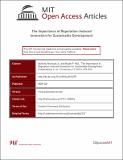| dc.description.abstract | This article explores the complex relationship between environmental regulation,
innovation, and sustainable development within the context of an increasingly globalizing
economy. The economic development, environment, and employment aspects of
sustainable development are emphasized. We contend that the most crucial problem in
achieving sustainability is lock-in or path dependency due to (1) the failure to envision,
design, and implement policies that achieve co-optimization, or the mutually reinforcing,
of social goals, and (2) entrenched economic and political interests that gain from the
present system and advancement of its current trends. The article argues that industrial
policy, environmental law and policy, and trade initiatives must be ‗opened up‘ by
expanding the practice of multi-purpose policy design, and that these policies must be
integrated as well. Sustainable development requires stimulating revolutionary
technological innovation through environmental, health, safety, economic, and labor
market regulation. Greater support for these changes must also be reinforced by ‗opening
up the participatory and political space‘ to enable new voices to contribute to integrated
thinking and solutions. | en_US |
